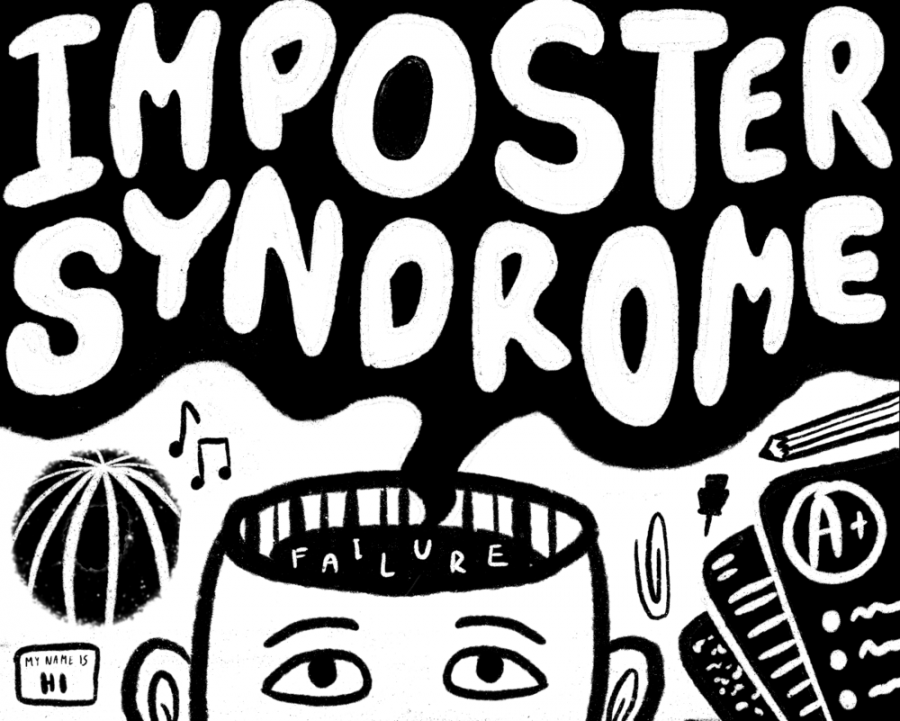Imposter Syndrome
Many high school seniors are experiencing imposter syndrome amid college admissions season.
April 16, 2021
With college results coming out this season, students are enthusiastic about embarking on another chapter of their lives. However, some high school seniors have been “diagnosed” with a phenomenon called imposter syndrome. Although imposter syndrome is not an official diagnosis on the Diagnostic and Statistical Manual of Mental Disorders (DSM), it is a serious issue that people experience. According to the Harvard Business Review, imposter syndrome is defined as a “collection of feelings of inadequacy that persist despite evident success.”
Individuals with imposter syndrome may experience feeling like a fraud, doubting one’s abilities, and not being able to accept one’s accomplishments. The main reason for imposter syndrome is not feeling good not enough, which may be triggered when students are accepted into prestigious institutions. Camille Khong (10) discusses how she has noticed “many students have lacked confidence in their abilities due to the high rigor of school” and due to students constantly comparing themselves with other classmates and “[she] has talked to many graduates and those applying to university and a common theme was that they all felt dissatisfied with themselves at some point in their school career.”
This phenomenon is especially prevalent in first-generation students of color due to their background and status, leading them to feel as if they do not belong. Also, first-generation students are more likely to suffer imposter syndrome in STEM environment classes, according to research published in Social Psychological and Personality Science.
There are several harmful impacts of having imposter syndrome. For instance, imposter syndrome makes people doubt their work resulting in them not seizing opportunities. Also, imposter syndrome may damage one’s mental health. Common feelings and thoughts resulting from imposter syndrome include, “I must not fail,” “I feel like a fake,” “It’s all down to luck,” and “Success is no big deal.” (Harvard Business Review). In addition, side effects one may experience include mental disorders such as anxiety and depression (American Psychological Association).
However, there are possible solutions to help overcome imposter syndrome. First, becoming aware of having imposter syndrome and tracking one’s thoughts and feelings is crucial. It is particularly important to note what these thoughts and feelings are and when they occur. Seeking support from peers and talking about what one feels is another crucial step towards overcoming this syndrome. Another important reminder for those suffering is that one can not know everything, and the progression of understanding this is a learning process. With failure results in learning opportunities and requires the reminder to not be too hard on oneself, and mistakes will eventually occur. For motivation, it can help to disregard imposter syndrome by visualizing success to help keep focused on goals.
Amid college decision season, high school seniors that have been accepted into prestigious universities may feel as though admission officers have made a “mistake,” but it is essential to recognize that acceptees have earned and deserved their acceptance through their dedication from their four years of high school.























Tiana Salisbury • Jun 3, 2021 at 8:15 AM
I agree that students accepted into prestigious schools should be proud of their accomplishments. Thank you for writing about this informative topic!
Nikole Galea • May 24, 2021 at 8:40 AM
Great article, up until this point I had no clue what it was. This was super informative and went into great detail. I could see that many people will relate to this article and hopefully realize that it is all in their head.
Fiona Salisbury • May 14, 2021 at 9:31 PM
This was such a great article! Hopefully, people will be able to see that they are not alone with their struggles with imposter syndrome.
Karina Shah • May 3, 2021 at 9:11 PM
This is super educational and such an important topic. I really think that psychological disconnect has been a very big part of this past year and it should be widely talked about and destigmatized.
Kayden Mandley • Apr 25, 2021 at 10:00 PM
This is such a great article, Anita, and super educational! I didn’t know what imposter syndrome was and how big of an issue it is.
Nikole Galea • Apr 25, 2021 at 9:29 PM
I definitely see what you are saying here Anita, great article. Your article is definitely bringing more light to the situation for others, me especially since I just heard of it.
Emma Perron • Apr 18, 2021 at 10:04 PM
I have never heard about this before, that is crazy. I do believe people never give themself enough credit for things they do. This blows my mind, I loved this article.
Suhani Bhanvadia • Apr 18, 2021 at 4:44 PM
Great article! There are so many people that need to give themselves more credit for their accomplishments. Sure, some people may have just got lucky but others should still feel proud of their hard work.
danielle huizar • Apr 17, 2021 at 8:46 PM
I loved how this article explained what imposter syndrome is and how to overcome it. I think the point about how people think college acceptances and successes are down to luck is important because for many people, they’ve been told that getting into their dream college was just luck. However, that is not the case, as they worked extremely hard to get there and should not have imposter syndrome.
Sharon Sun • Apr 17, 2021 at 7:55 PM
I completely agree with this Anita! I feel like students who have been accepted into prestigious universities should be absolutely proud of their own ambitions and efforts paying off into the results that they are seeing. Great article!